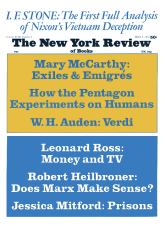In response to:
Muhammad Muckraked from the January 27, 1972 issue
To the Editors:
Professor Elwell-Sutton says [NYR, January 27] that “for a present-day historian to ignore” “the possibility of extra-human intervention in human affairs…is to emulate the example of the medieval inquisitors who refused to consider Galileo’s theory that the earth was round.” Other passages in his review suggest that by “extra-human intervention” he means a divine action or inspiration which is not rationally explicable. If this is so, then I am of course troubled that he should advocate what seems to me a return to historical obscurantism; and more troubled that he should support it with the perverse example of the trial of Galileo, which was the most important confrontation in European history between scientific rationalism and religious dogma. But these are matters of opinion; what troubles me most is the matter of fact. After decades of the two cultures, surely Professor Elwell-Sutton should not write “medieval” when he means “seventeenth century,” “consider” when he means “accept,” “Galileo’s” when he means “Copernicus’s,” and “the earth was round” when he means at the least “the earth moves round the sun.”
J. Bronowski
The Salk Institute for Biological Studies
San Diego, California
L.P Elwell-Sutton replies:
Professor Bronowski believes himself to be “troubled most” by my carelessness in writing “the earth was round” instead of “the earth moves round the sun” (the other words complained of say just what I meant). I apologize. But it is quite obvious that what really bothers him is the suggestion that scientific rationalism may not be the whole truth. For Bronowski, as for Rodinson, rationalism is God, and to knock it is near-blasphemy.
No, I’m afraid it is Bronowski who is the historical obscurantist. I merely ask historians to consider the possibility of the supernatural; he, bound hand and foot by scientific dogma, will not have it at any price—and in this respect he is no better than the medieval inquisitors who condemned Galileo in 1633.
This Issue
March 9, 1972



